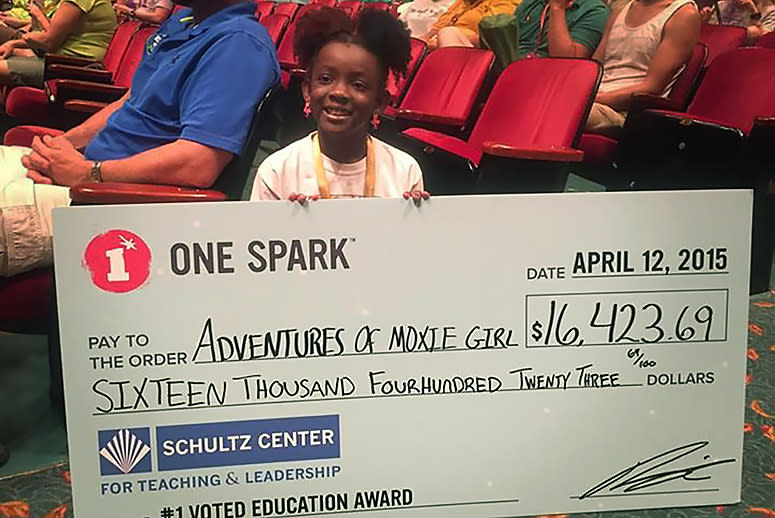A 7-Year-Old's Book Turns Kinky Coils Into a Lovable Superpower

Like so many other little black girls, Angela Nixon’s 7-year-old daughter struggled to accept her kinky hair and dark skin. While Nixon tried to encourage her daughter, Natalie McGriff, to embrace her looks by showering her with kind words and affirmations, nothing really seemed to take hold.
“I would tell her how cool and awesome she is. I even started a Facebook page called Natalie You Are Beautiful, and my friends would write words of encouragement on there,” Nixon says. “But it was still hard.”
The problem? Natalie wanted to change her hair. “I didn’t like it because I wanted it straight, and I saw everybody with straight hair,” she told ABC News.
Nixon, a community organizer in Jacksonville, Florida, says that despite her efforts to boost her daughter’s self-esteem, the lack of images of African American girls in the media made it difficult for her empowering message to stick.
“There aren’t that many boys or girls of color on TV or in movies, so we tried to read books that had characters who looked like her,” Nixon says. But even that was hard to pull off. So she decided to write a book with her daughter to help bolster her self-esteem and encourage her to read. Although it began as just a cool mother-daughter project, The Adventures of Moxie Girl quickly found fans.
In the book, Moxie Girl—who is based on Natalie—doesn’t like her hair very much because it’s different. But after her godmother gives her some magic shampoo, Moxie Girl learns that her kinky coils have superpowers. Like any good hero, Moxie Girl springs into action and uses her gifts to save her town’s library from book-eating monsters.
Diverse children’s books such as The Adventures of Moxie Girl are uncommon. According to a 2014 survey by the Cooperative Children’s Book Center at the University of Wisconsin, of the 3,500 children’s books published in the United States in 2014, just 11 percent centered on people of color. Last year, only 179 books were about black characters, Asian or Asian American protagonists were found in 112 books, just 66 books focused on Hispanics, and a meager 36 books included Native American leads.
The response of the public has been overwhelmingly positive. Earlier this month, Nixon and her daughter presented their book at One Spark, a crowdfunding festival in Jacksonville, and beat out over 500 competitors to take home the top prize. The pair won more than $16,000, which will help them put the Moxie Girl character into a series of children’s books. But, says Nixon, that wasn’t even the best part.
“We had young girls running up to the huge, six-foot banner of Moxie Girl, and they were like, ‘Mommy, Mommy, that looks like me!” Nixon recalls. “I’ve been receiving messages on the Facebook page from moms telling me they let their daughters see the page and read the stories and articles about Moxie Girl, and they think it’s awesome.”
The Adventures of Moxie Girl marries Nixon’s two biggest passions: her commitment to community organizing and her love for Natalie.
“Education is really important to me, and we were having issues in Jacksonville with funding for libraries,” she explains, noting that public libraries are particularly vital in communities of color, where many children don’t have access to books at home. Last summer, several Jacksonville residents rallied against cuts to the city’s library budget, which saw its funding slashed by $3.5 million.
On the surface it would seem like mixing community activism with positive messages about kinky hair is an odd paring, but Nixon’s own experiences prove otherwise.
“I [work] in the political arena, and I’ll never forget, I was told, ‘You can’t keep changing your hair, you need to relax it,’ ” she says of her own battle to get people to accept her natural hair. While many beauty companies are starting to catch on that black women embracing their kinky and curly hair translates into big business—to the tune of about $700 million annually—Nixon thinks the professional sector still has deep-seated issues with black women’s hair.
“Why do I have to put chemicals in it to change the texture of my hair? This is the way it grows out of my head,” she says, frustrated that many still view kinky hair as unattractive and unprofessional.
For Nixon, getting people to accept her hair and setting a positive example is exactly why The Adventures of Moxie Girl is so important.
“I just want my daughter to be happy with who she is. A lot of people have to compromise who they are, and I don’t want my daughter to do that,” she says. “I want her to love who she is and just be proud.”
Related stories on TakePart:
• On Television, Big, Natural Hair Is Stealing the Show
• Outdoor Afro Fights Stereotypes That Blacks Don’t Camp
• Guess What Hairdo Got a 7-Year-Old Kicked Out of a Classroom
Original article from TakePart

